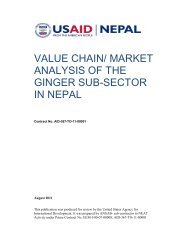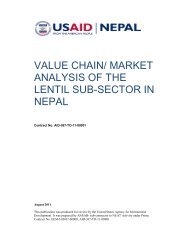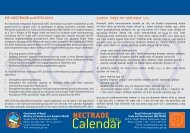value chain/ market analysis of the orthodox tea sub ... - Nepal Trade
value chain/ market analysis of the orthodox tea sub ... - Nepal Trade
value chain/ market analysis of the orthodox tea sub ... - Nepal Trade
You also want an ePaper? Increase the reach of your titles
YUMPU automatically turns print PDFs into web optimized ePapers that Google loves.
5. STRATEGIC AREAS FOR NEAT INTERVENTIONThe strategic interventions for this project are divided as short term and long term. Theeffects <strong>of</strong> <strong>the</strong> short-term strategies will be seen as outcomes <strong>of</strong> <strong>the</strong> NEAT project. Thesuggested interventions are categorized in five parts: input supply, production/productivity,processing, <strong>market</strong>ing, and policy. Long-term strategies are also suggested which will behelpful to uplift <strong>the</strong> <strong>orthodox</strong> sector <strong>of</strong> <strong>Nepal</strong> and whose outcomes can be evaluated beyond<strong>the</strong> project period.5.1 Short term strategy5.1.1 Production and Productivity· Pilot plucking machines: Plucking machines are available in <strong>market</strong>s for <strong>tea</strong>harvesting. It has been used in plains in CTC plantation area; however <strong>the</strong> machine isstill needed to be piloted in <strong>orthodox</strong> plantation because <strong>of</strong> <strong>the</strong> sloped landscape andextra care required. These machines can be provided to farmers through FBOs andcooperatives in certain production pockets for piloting.· Training to Agrovets on pesticides: This would be beneficial in raising awarenessand educate <strong>the</strong> agrovets and mobilize <strong>the</strong>m to spread words to farmers.· Conduct interactive meetings between input suppliers and farmers: This will helpto build trust among agrovets and farmers and provide an opportunity for beinginformed on <strong>the</strong> quality inputs and proper methods <strong>of</strong> application· Support for easy access to organic inputs: Partnership can be done with inputsuppliers to provide easy access to organic manures, bio-fertilizers, bio-pesticides andinsecticides. Facilitation should be provided to introduce alternative input supplyingcompany.· Establishment <strong>of</strong> composting plants: Support can be provided for <strong>the</strong> establishment<strong>of</strong> biogas plants and vermi-composting at farmers level. In addition, cattle can beprovided and shed made in <strong>the</strong> field that will provide raw material for <strong>the</strong> plants andalso help in increasing soil fertility due to direct seepage <strong>of</strong> <strong>the</strong> excreta.· Support in packaging materials to farmers: Packaging materials such as nets canbe provided in <strong>sub</strong>sidized rates for farmers to maintain freshness <strong>of</strong> <strong>the</strong> leaf.· Study and piloting <strong>of</strong> irrigation system: Tea plantation in <strong>Nepal</strong> is totally dependenton rainfall that makes it difficult for <strong>the</strong> year round quality leaf production. Due tosloppy landscape, <strong>the</strong> usual irrigation method is not possible. However, from <strong>the</strong>consultation with experts and <strong>tea</strong> garden owner, it is understood that <strong>the</strong> (drip fornursery and young <strong>tea</strong>/sprinkler for mature gardens) irrigation can be a useful medium<strong>of</strong> irrigation but <strong>the</strong> initial cost is comparatively high. Ano<strong>the</strong>r alternative forirrigation can be rain water harvesting. A detail study should be conducted on <strong>the</strong>feasibility <strong>of</strong> <strong>the</strong> both irrigation types in <strong>the</strong> production pockets and if found feasible,a piloting should be done as per <strong>the</strong> findings <strong>of</strong> <strong>the</strong> study.· Facilitate for establishment <strong>of</strong> nurseries and quality clone development: Since<strong>the</strong>re is lack <strong>of</strong> commercial nurseries for <strong>tea</strong>, NEAT can provide initial support toFBOs , cooperatives or private entrepreneur for establishment <strong>of</strong> such nurseriesprovided that <strong>the</strong> long term sustainability is assured and proper benefits are sharedamong farmers. Normally, <strong>the</strong> nurseries can be developed and its trade activity atlocal level initated within 16 months.· Conduction <strong>of</strong> trainings to farmers for improved quality production andincreased productivity: Quality begins from <strong>the</strong> farm level. In order to achieveproducts that are <strong>of</strong> international standards, increased productivity, and are alsoValue Chain/Market Analysis-Orthodox Tea 35






